In scenarios where external power (electricity, batteries) is unavailable—such as remote construction sites, emergency power outages, or harsh outdoor environments—traditional electric starters often fail. However, mechanical starters, relying on purely mechanical energy storage and release, become the most reliable engine-starting solution. Below is a detailed analysis of their advantages, applicable scenarios, and irreplaceable value.
1. Core Advantage: Breaking Dependence on External Power
The biggest highlight of mechanical starters is their complete independence from external energy sources, which stems from their simple yet efficient working principle.
Mechanical starters (mainly spring-type) use high-strength coil springs as energy storage components. Before starting, users manually rotate the handle or use a small auxiliary mechanism to compress the spring, converting human power into spring potential energy. When triggered, the spring rapidly expands, driving the transmission gear set to rotate the engine crankshaft at high speed—this directly ignites the engine without needing batteries, power grids, or fuel-driven auxiliary devices.
Compared with electric starters that fail due to dead batteries or power outages, mechanical starters avoid "energy supply bottlenecks." Even in low-temperature areas where batteries lose efficiency or remote areas with no power infrastructure, they can start engines stably with only manual operation.
2. Key Applicable Scenarios: Where External Power Is Hard to Reach
Mechanical starters shine in scenarios where external power is scarce or unreliable, covering multiple industries and emergency situations.
2.1 Emergency Backup for Critical Power Equipment
Diesel generators are essential for hospitals, data centers, and communication base stations to cope with power outages. If the generator’s electric starter fails (e.g., battery self-discharge during long idle periods), a mechanical starter becomes the "last line of defense."
For example, in mountainous communication base stations with infrequent maintenance, batteries are prone to depletion. Maintenance personnel can start the generator manually via a mechanical starter within 1–2 minutes, ensuring uninterrupted signal transmission. In hospitals, it prevents power gaps in operating rooms or intensive care units caused by electric starter failures.
2.2 Remote Agricultural & Construction Machinery
Agricultural equipment (small tractors, irrigation pumps) and portable construction machinery (mini-excavators, air compressors) often work in rural fields or remote construction sites with no stable power supply. Carrying heavy batteries for electric starters is inconvenient, and charging is difficult.
Mechanical starters solve this problem: farmers only need to turn the handle a few times to start tractors for sowing or harvesting; construction workers can activate air compressors without worrying about battery power, ensuring work schedules are not delayed by power issues.
2.3 Harsh Environment Operations (Marine, Mining)
In marine environments with high humidity and salt spray, or underground coal mines with flammable gas, electric starters face two major risks: battery corrosion failure and spark-induced explosions. Mechanical starters, with no electrical components, avoid these hazards.
Marine lifeboats, for instance, use mechanical starters to ensure the engine can start quickly even if the main power system is damaged in storms. In coal mines, they start ventilation fans or small transport vehicles, complying with strict explosion-proof standards while maintaining reliability.
3. Additional Merits: Durability and Low Maintenance
Beyond independence from external power, mechanical starters have two other advantages that solidify their "ideal solution" status:
- Strong durability: They have simple structures—only springs, gears, and manual control components—with no vulnerable parts like battery electrodes or circuit boards. Under normal use, their service life can exceed 10,000 startup cycles, far longer than electric starters that require battery replacement every 2–3 years.
- Low maintenance cost: Maintenance only involves occasional lubrication of gears and springs to prevent rust. There’s no need for regular battery charging, circuit checks, or replacement of electrical parts, which significantly reduces long-term use costs—especially for equipment in remote areas where maintenance is difficult.
4. Conclusion: Irreplaceable Value in Power-Scarce Scenarios
While electric starters are convenient for daily scenarios with stable power, mechanical starters are irreplaceable in environments without external power. Their ability to start engines independently, adapt to harsh conditions, and maintain long-term durability makes them the most reliable choice for emergency backup, remote operations, and special industry needs.
As industries like agriculture, emergency rescue, and mining continue to develop, the demand for "power-independent starting solutions" will grow. Mechanical starters, with their unique advantages, will remain the ideal choice for engine start without external power, providing stable support for equipment operation in various challenging scenarios.

